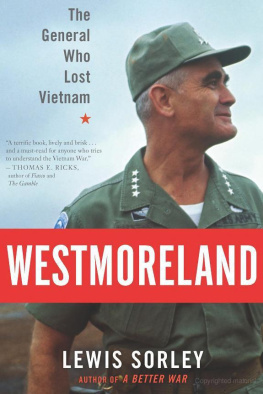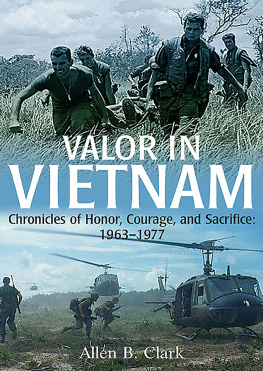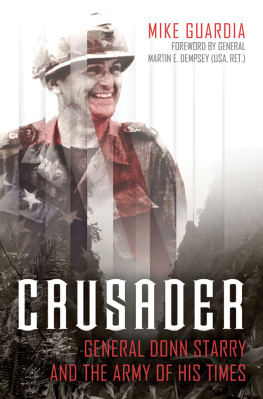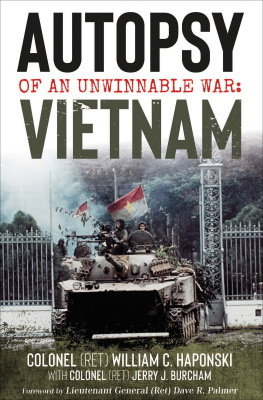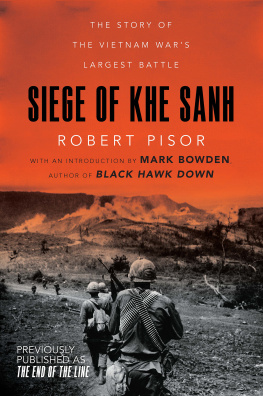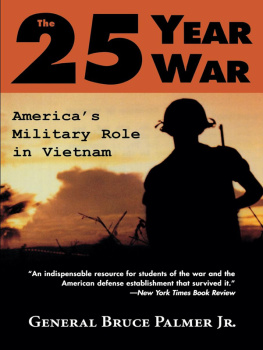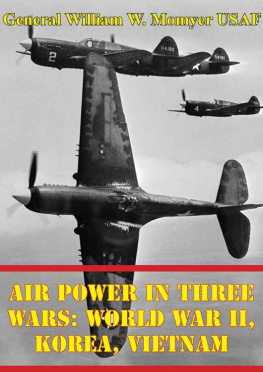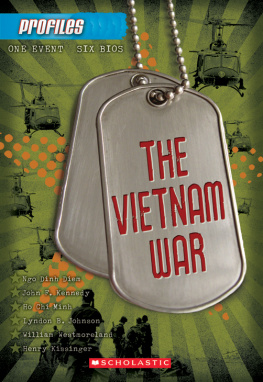Epilogue
T AKEN ALTOGETHER, THE life story of William Childs Westmoreland turned out to be infinitely sad. It had begun with such promiseEagle Scout at fifteen, journeyer to Europe and the World Scout Jamboree, president of the high school senior class, Citadel cadet, First Captain at West Point, battalion commander at age twenty-eight, with the Presidential Unit Citation earned in combat in North Africa, full colonel at thirty, then a brigadier at thirty-eight while leading the airborne regimental combat team in Korea, major generalyoungest in the Armyat forty-two, serving at the right hand of the famous Maxwell Taylor, then sent by him to command the storied 101st Airborne Division, on to West Point as the dashing Superintendent with the young and beautiful Kitsy at his side, and the three attractive children she had borne him, familiar then with so many greats of an earlier dayMacArthur, Eisenhower, Omar Bradleythen corps command, again with his beloved airborne, and the third star. The future seemed to hold limitless possibilities, perhapssaid someeven the presidency.
Then came Vietnam, where the great arc of triumph and achievement peaked and fell, never to be recovered, although doggedly rationalized, explained, rued, regretted, for the rest of his days. The lifelong aspirationArmy Chief of Staff, the crowning achievement for a professional soldier, was attained, but only as a bitter and unsatisfying post in the shadow of Vietnam. Then retirement, a book, endless rounds of speeches, all exculpatory but ultimately unconvincing. A plunge into politics, against the advice of wise friends and advisors, leaving a baffled neophyte defeated almost before he began. Then a lawsuit, charging a powerful and wealthy network with libel, again bucking the advice of those who wished him well and knew what they were talking about, and again abject failure, a last-minute withdrawal rather than face a jury's verdict, followed by lame and painful efforts to portray that outcome a victory.
Along the way he shed what sense of humor he might once have had, seldom smiled, held himself in a rigid posture that often seemed a pose, took himself very seriously, expected others to regard him thus as well.
His ultimate failure would have earned him more compassion, it seems certain, had he not personally been so fundamentally to blame for the endless self-promotion that elevated him to positions and responsibilities beyond his capacity. "It's the aggressive guy who gets his shareplus," he insisted. "That principle applies to most anything."
"Great division commander," concluded another famous four-star. "He had this great appearance, and this charisma, to lead the 101st." Those were the best days, the balance between tasks and abilities still viable, the conceptual requirements minimal, much physical work, and a managerial span he could handle. Despite a certain sillinessmost often displayed in a lifelong penchant for giving "cutesy" names to programs and operationshe was taken seriously, and at that stage not only by himself. He looked and acted like a great general, and the troops were convinced of it. Small wonder that he remembered those days as the most satisfying of his military career.
In later years Westmoreland, widely regarded as a general who lost his war, also lost his only run for political office, lost his libel suit, and lost his reputation. It was a sad ending for a man who for most of his life and career had led a charmed existence.
In his final days it could never be said he'd been broken, for he still maintained the mien and demeanor of the glory days, much of the "look of eagles" his splendid countenance had always afforded him, the obvious expectation of being admired and courted by others. But, at least with family and, back in his native South Carolina, certain very old friends and some new admirers, elements of his youthful charm seem to have reemerged. Said his daughter Stevie, describing those last years, "every day we're seeing less and less General and more and more Daddy."
Acknowledgments
W ORK ON THIS biography has consumed a number of years, during which time very many people have encouraged and assisted me. First, of course, tribute must be paid to the indispensable community of archivists, librarians, researchers, and historians upon whom so much depends. Then those who served with Westmoreland and talked with me about that experiencesome 175 people in allprovided invaluable and often unique and previously undisclosed elements of the account. Also of great importance were the encouragement and assistance of friends who believed in the historical importance of the story and were sympathetic to the uncongenial task of telling it.
General Westmoreland's personal papers are in the South Caroliniana Library at the University of South Carolina, a charming venue situated on the Horseshoe of this historic campus. There I benefited greatly from the assistance of Herbert Hartsook, Director when I began my work there; his successor, Dr. Allen Stokes; and Beth Bilderback, Graham Duncan, Sam Fore, Henry Fulmer, Craig Keeney, Nicholas Meriwether, and Elizabeth West of the staff. Brian Cuthrell was particularly helpful and knowledgeable about the collection.
Other valuable Westmoreland materials, including copies of his remarkable "History Notes," are held by the U.S. Army Center of Military History at Fort McNair in Washington. There the Chief of Military History, Brigadier General John Sloan Brown, and his successor, Dr. Jeffrey Clarke, provided valuable assistance. I also thank Patricia Ames, Dr. Richard Davis, Vincent Demma, Dena Everett, Joseph Frechette, Lenore Garder, Dr. Joel Meyerson, Mason Schaefer, Jamaal Thomas, and Dr. Erik Villard. Frank Shirer, Chief of the Historical Resources Branch and custodian of much valuable Westmoreland material, was especially knowledgeable and helpful. Also thanks to Renee Klish, curator of the Army Art Collection.
Yet another essential repository is the U.S. Army Military History Institute at Carlisle Barracks, Pennsylvania. Among its holdings are two separate and very useful Westmoreland oral history interviews running to several hundred pages, as well as similar interviews with other senior officers who served with Westmoreland, plus the papers of many such senior officers. The Director, Dr. Conrad Crane, and also Dr. Richard Sommers, David Keough, and Randy Rakers, all valued longtime friends, were extremely helpful. Thanks also to Rich Baker, David Birdwell, Tom Hendrix, and Jessica Sheets. Randy Hackenburg was very helpful with photos.
Some Westmoreland material can also be found at West Point in the U.S. Military Academy Archives and Special Collections, headed by Suzanne Christoff. My valued friend Alan Aimone was also most helpful in the USMA Library. Elsewhere on post Carolyn Knicht helped me with access to Westmoreland's cadet records.
Also at West Point tribute must be paid to the superb work done by Lieutenant Colonel Julian M. Olejniczak, longtime Editor in Chief of the invaluable Register of Graduates and of Assembly, the West Point alumni magazine, and to Sylvia Graham, Managing Editor of the Register. Both publications are of crucial importance to anyone writing about a graduate of the Military Academy. Syl Graham also generously provided the author photo for this book.
The Lyndon Baines Johnson Presidential Library in Austin, Texas, has copies of some of the material held elsewhere, as well as valuable oral histories, a superb photo collection, anda unique and poignant artifactthe model of Khe Sanh kept in the White House Situation Room for contemplation by LBJ during the 1968 siege of that remote outpost in Vietnam. Archivist John Wilson, Margaret Harman in the audiovisual archives, and Rene Gravois, Mike McDonald, and Tina Houston were very helpful to me.

